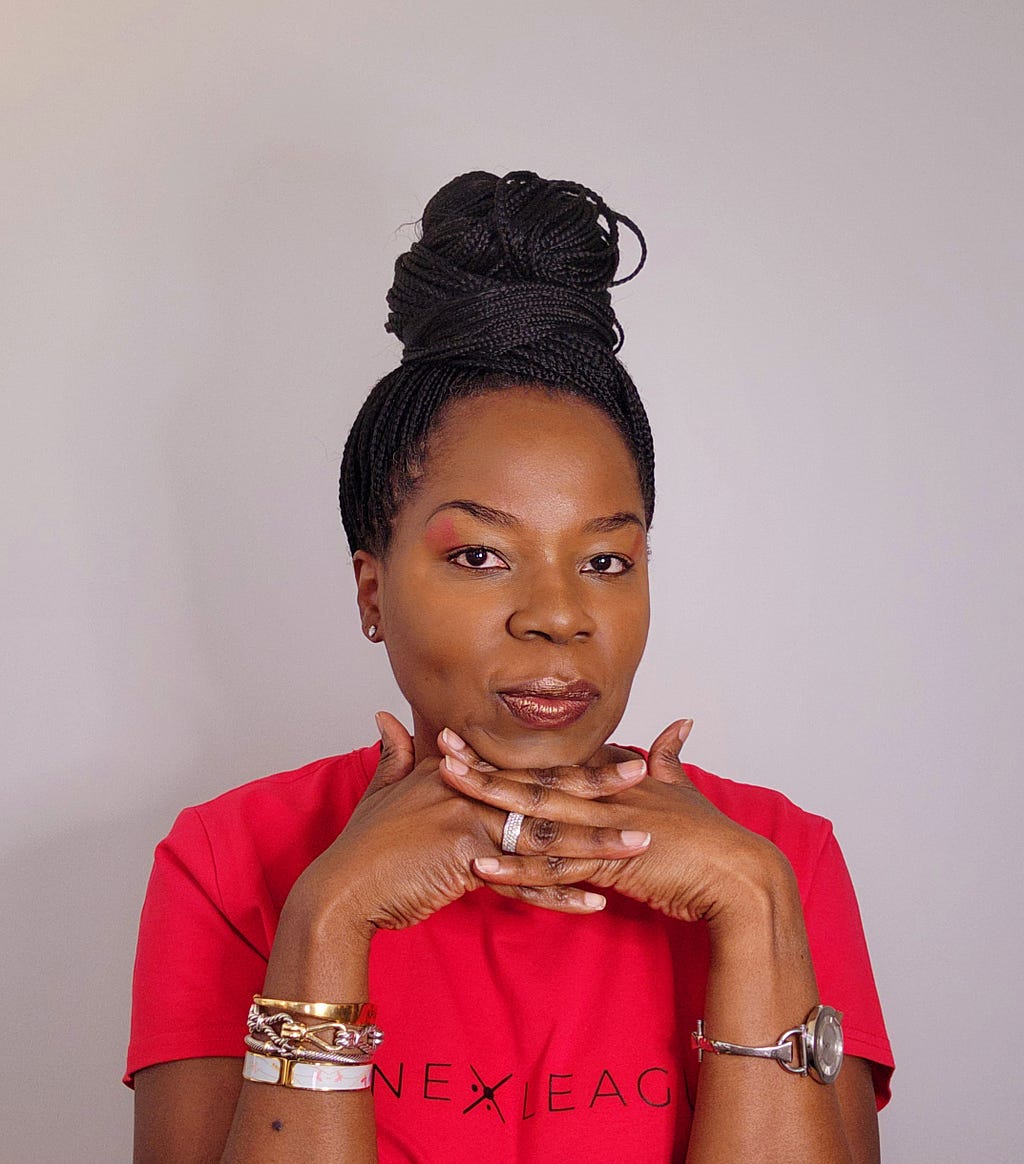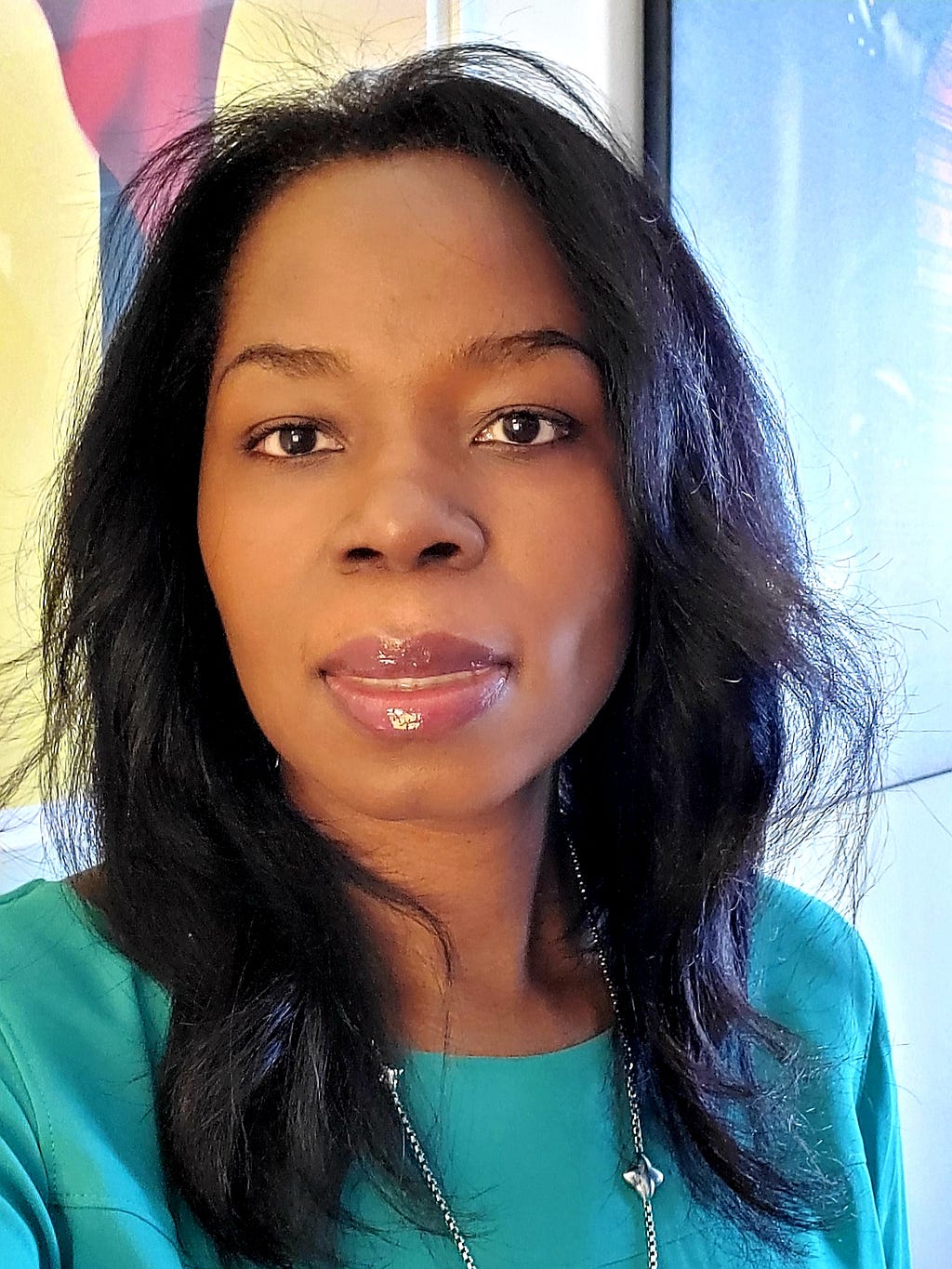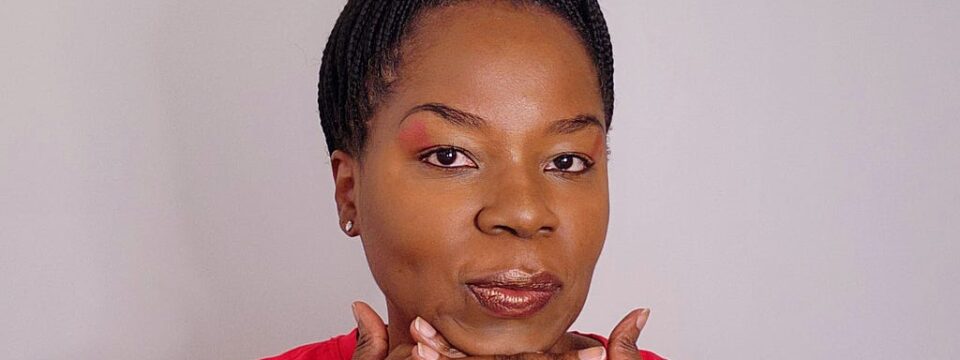Shadé Akande of ONE X LEAGUE On 5 Steps We Must Take To Truly Create An Inclusive, Representative, and Equitable Society

Celebrate and Share Wins. Once you have proven success, share your story and progress with others. Be an ally and ambassador for good. Inspire others to do the same and let them know it’s possible and how you’ve done it. Also, sharing your story highlights that it’s important.
As part of our series about ‘5 Steps We Must Take To Truly Create An Inclusive, Representative, and Equitable Society’ I had the pleasure to interview Shadé Akande.
Shadé Akande (she/her) is the Founder and CEO of ONE X LEAGUE, a private social network that provides exclusive curated experiences for Black and Afro-Latinx women executives and founders. With over 18 years of global experience in HR executive roles at industry giants like Google, Walmart, and Verizon Wireless, Shadé uses her expertise and passion for revolutionizing global strategic people operations to promote diversity in leadership and build an engaged community of exceptional women leaders.
Thank you so much for doing this with us! Before we dig in, our readers would like to ‘get to know you’. Can you tell us a bit about how you grew up?
Absolutely. I grew up in NYC in the 80s with immigrant parents and three siblings during the growth of hip-hop culture. I was a creative child and even though my parents objected vehemently, I attended the High School of Fashion Industries in Manhattan. It was one of the best decisions I’ve ever made and is still one of my favorite time periods of life. When it came time to decide on college, I selected Virginia State University, solely because it was the furthest away from home of all the schools I applied to. My parents objected to that decision even more. Again, one of the best decisions I’ve made. VSU was an HBCU, I thrived academically and I was surrounded by excellence. I ended up transferring to and graduating from Syracuse University, which was also a meaningful experience.
Is there a particular book that made a significant impact on you? Can you share a story or explain why it resonated with you so much?
After graduating college, I read a slew of novels from Black authors such as Connie Briscoe, Eric Jerome Dickey, Bebe Moore Campbell, and others that both entertained me and introduced me to the Black cultures of places I’d never been. It inspired me so much that I decided to relocate out of NYC and experience somewhere new. My travel had been limited up until that point so I made a shortlist of places that I’d never been to that I’d consider for relocation (many were cities in the books I’d read). Atlanta was the first place on my list so I called a friend who was living there and I booked a flight. Because I had such a positive experience in Atlanta, my research was complete! My “positive experience” included: a friendly older woman who said Hello to me in Atlanta’s airport (I wasn’t accustomed to strangers smiling and greeting me in NYC), sunshine every day, and the most impactful thing was the cost of living difference. I was sold and a few weeks later I loaded a Penske truck and headed to the ATL. I lived in Atlanta for over nine years before spending a few years in California and then relocating back to NYC in 2016.
Do you have a favorite “Life Lesson Quote”? Do you have a story about how that was relevant in your life or your work?
I’m a collector of motivational quotes, lol. I share them with my people, post them on the wall, and replace my favorite ones often. Currently, one of my favorite “life lesson quotes” is, “Discipline is the strongest form of self-love. It is postponing current pleasure for bigger rewards to come. It’s loving yourself enough to give yourself everything you ever wanted.” Isn’t that amazing — and so true? I’m very curious about people and their origin stories, especially people who’ve had impact. Whether I’m conversing with someone, interviewing them, or reading their story, the common thread of their success is discipline and there really isn’t any way around it. Luck plays a part but that’s only as sustainable as the prep and discipline of the individual.
I live a very disciplined life when it comes to my business, time, wellness, and what I consume — not including my carbohydrate consumption 🙂 And I have the life receipts of how that approach has served me well. I have amazing relationships, I’m physically healthy and my business is thriving. An example of how discipline has served me well in business is a commitment I made on day one about the type of members that would be (and remain) a part of ONE X LEAGUE. The “who” is critical to the overall experience of our members. Not only do all members have to align with and continuously demonstrate kindness with other members but ONE X LEAGUE also doesn’t practice automatic renewal of anyone’s membership. Ever. All memberships are annual and renewal for an additional year is by invitation and only for those who continue to be kind, engaged members. The caliber of members continues to be a highly rated KPI from member feedback. This discipline keeps us focused on the quality of experience and not the quantity of total members.
How do you define “Leadership”? Can you explain what you mean or give an example?
Leadership is influence over people that results in them taking action, and it can be good or bad. There are different leadership styles, but leadership itself moves people to do something. If someone is a poor leader, the action that people take may intentionally be the opposite of what the leader requested. Also, a person can be a leader at any age and stage of life (from a child on a softball team to a parent to a CEO).
An example of a strong executive leader is one with emotional intelligence who shares context with their team, business objectives, team goals, expectations, desired outcomes, resources, support, in an environment where collaboration is fostered, innovation is encouraged and “failure” is considered learning that doesn’t result in punishment.
Ok, thank you for all that. Now let’s move to the main focus of our interview. In the summer of 2020, the United States faced a very important self-reckoning about race, diversity, equality and inclusion. This is, of course, a huge topic. But briefly, can you share your view on what made the events of 2020 different from racial reckonings in the past?
In my opinion, the only reason 2020 felt different to people is because everyone was stuck at home and forced to “watch the same movie”, which was the abuse and murder of Black people in America. The stories weren’t new, people just didn’t have the option to ignore the current story because it flooded all forms of media. The excuse of not being aware was removed from the options of excuses.
Can you tell our readers a bit about your experience working with initiatives to promote Diversity and Inclusion? Can you share a story with us?
Prior to launching ONE X LEAGUE, I was an HR executive for some time. My responsibilities included leading people operations, talent acquisition, learning and development, total rewards, internal communications, people experience, and diversity, equity, inclusion, and belonging (DEIB). The two most important areas of focus should always be people experience and DEIB because if either is unhealthy, the organization will suffer. And fewer resources are required to make each one a priority in the beginning than are required to correct (or band-aid) the organization later.
In addition to building and leading DEIB programs and teams, I also: worked on initiatives to ensure there was diversity within the hiring process (diverse candidate slates, diverse hiring teams), built leadership and development programs to support growth at all levels of the organization, evaluated and redesigned compensation structures and promotion processes/criteria, and created spaces for employees from all backgrounds/experiences to comfortably exist, connect and thrive. Each of these was not only critical to the success of the organization but also to the experience of the employee.
At one organization, I supported the formation of ERGs (Employee Resource Groups) and educated the executive team on their importance, potential impact, and need for both employee community and business insights. Some leaders were initially too focused on employee’s ‘time away from work’ for ERG meetings and programming. Not only did I explain that any time at work could not be considered ‘time away from work’ but I also required a budget for the ERGs. A few of my colleagues were against an ERG program so we compromised and went with a three-month pilot program.
During the three months, some leaders only saw ERG lunches, and panels with guest speakers and booked conference rooms. All of which some felt was a waste of time. Three months later during an executive meeting, I shared data on hiring successes for some hard-to-fill roles, product sales spikes (weird for me to share given my role), a brand ambassador program, and a new @Speak speakers series. A colleague reminded the CEO that we were at the three-month mark for the ERG program pilot and before we all voted on whether we continued the program or not, I was asked to share data to support my case. I let them know that I already shared data. They were confused. I told them that the information I just shared was all the results of our ERGs. The candidates hired were due to targeted ERG referrals. The product sales spike was due to an ERG social post and a personal connection with a founder. ERGs led the brand ambassador program and the @Speak speaker series, brought in some of the most impressive thought leaders for panels and events. There was no vote. We kept the ERG program.
This may be obvious to you, but it will be helpful to spell this out. Can you articulate to our readers a few reasons why it is so important for a business or organization to have a diverse executive team?
An organization’s ability to innovate and win will only be as strong as the diversity of experiences, perspectives, and ideas of their teams. This goes beyond race and gender. When we consider the experiences and exposure of parents vs non-parents, people over 60 vs new grads, remote employees vs those in-office, those with visible/invisible disabilities vs those who are able-bodied, veterans, those in the LGBTQIA+ community, introverts vs extroverts — you get it. When you are providing products and services to society (a society that’s made up of all of these types of people and more) it’s so much harder to win when you don’t meet a portion of your customers’ needs. You can’t even fully understand your customers. What’s challenging is that many organizations have experienced years of success even though they’ve excluded the needs of some, so the business case to have diversity of thought and experience remains lost on them. That’s until a competitor that values diversity enters the scene and disrupts everything.
And when you have diversity at the executive level, you’re less likely to commit a faux pas and have to backtrack, recall, be sued, or apologize. This is because you’ll have someone(s) at the table who can explain why a certain approach may be offensive to a group of your consumers. You’ll have someone(s) at the table who can advocate for paid maternity and paternity leave. You’ll have someone(s) at the org that potential candidates can see on the company website, identify with, draw positive conclusions about the organization, and be encouraged to apply.

Ok. Here is the main question of our discussion. You are an influential business leader. Can you please share your “5 Steps We Must Take To Truly Create An Inclusive, Representative, and Equitable Society”? Kindly share a story or example for each.
1. Care Authentically. This is the most important step and without it, all actions will be performative and unsuccessful in the long run. Whether the intentions are good (it’s the right thing to do) or self-serving (you want revenue to soar at your company), you have to care deeply in order to be committed to the other required steps. Caring looks like what you’d feel for someone you know and love. It also looks like what you’d feel for someone in need (a stranger or child) who’s the same race, religion, ethnicity, etc. as you. When you can have those same feelings for someone that’s different from you, you’re on the right track.
2. Develop a Strategic Plan. Understand that you’re likely not the subject matter guru for this, determine what your goals are, and then bring in the experts to help you identify bias/knowledge gaps (for self) or assess the culture (for organizations). Once you’ve partnered with someone(s) and they help build a strategy, trust it and do the work. A strategy looks like having a consultant come to your org and read through the most recent employee survey results then host a series of listening sessions with employees (no leaders) to hear directly from employees about what they’re experiencing. The data from both will be helpful in determining a strategy.
3. Enforce Accountability. You’ll need someone to hold you accountable to the objectives set and give you feedback on your actions and activities. This can be the same person/team that helped you develop the strategy but accountability must take place or else progress will stall. Accountability in the corporate setting can be tying DEIB goals to an executive’s compensation. If an executive’s bonus is tied to the success of diversifying their team by a specific percentage, bringing on a number of clients that are women/POC, or other activity based on the needs of the organization, that leader is more likely to take the DEIB objectives seriously.
4. Evaluate Progress Regularly. If you’ve taken the steps above and are experiencing progress and success with your efforts in building an inclusive, representative, and equitable environment, it’s important to check in with the people. Also, know that what got you here may not be what keeps you there. Solicit feedback and be open to pivot as the need arises.
5. Celebrate and Share Wins. Once you have proven success, share your story and progress with others. Be an ally and ambassador for good. Inspire others to do the same and let them know it’s possible and how you’ve done it. Also, sharing your story highlights that it’s important.
We are going through a rough period now. What makes you optimistic about the future of the US? Can you please explain?
I’m optimistic about the future because people are very often amazing and show up to do the right things when needed most. Also, my hope isn’t in the things of this world so that’s my constant and my unwavering foundation. History has shown that life is cyclical and even during the most challenging times, we have the ability to prevail and have prevailed.
Is there a person in the world, or in the US, with whom you would like to have a private breakfast or lunch, and why? He or she might just see this, especially if we tag them. 🙂
There are so many people I’d love to break bread with and learn more about. If I had to pick one, it would be Michelle Obama. There’s so much I want to thank her for. I’ll never know the depths to which she was tried during her years as first lady (and beyond) but I’ll always know the class she exuded in the midst of it all. But I wouldn’t bore her with questions she’s been asked a thousand times. We’d play Spades.
How can our readers follow you online?
I can be found via LinkedIn or via my company @onexleague on IG.
This was very meaningful, thank you so much. We wish you only continued success on your great work!
Shadé Akande of ONE X LEAGUE On 5 Steps We Must Take To Truly Create An Inclusive, Representative… was originally published in Authority Magazine on Medium, where people are continuing the conversation by highlighting and responding to this story.
